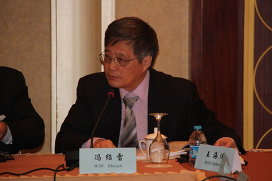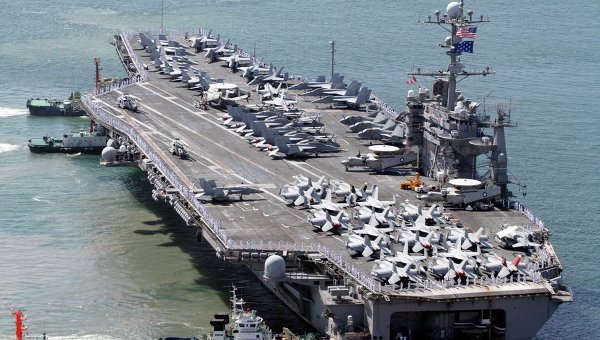A Changed but still Expected Military Strategy Report
A Changed but still Expected Military Strategy Report
South Korea-US military exercises
© REUTERS/ Truth Leem
10:22 16/02/2011
By Feng Shaolei
Brief Comment on the National Military Strategy of the U.S. 2011
For any Chinese person, reading a report like this about military strategy which is related to a greater or lesser extent to China is not the best follow-up to the traditional Spring Festival holidays, but it’s by no means all bad news.
There is, however some bad news: the U.S. is, after all, putting ever more strategic military focus on Asia and is increasingly targeting one particular part of it, described as “another rising global power”. Surely, no one is left in any doubt that this is a reference to China.
Feng Shaolei, Conference of the Russian-Chinese section of the Valdai International Discussion Club in Shanghai
A decade or so after the United States placed the fight against terrorism as its primary strategic goal it is now fundamentally shifting its strategic focus to the Asia-Pacific region. Moreover, in the past half year, the United States has been quite open about regrouping its allies in the Asia-Pacific region, including Japan, South Korea and Australia. This is the first time in years that the U.S. has concentrated so many aircraft carriers in East Asia and, even more unusually, has launched military exercises in the Yellow Sea region. It is claimed that this will “maintain stability in the Korean Peninsula”. However, Asia has not seen anything on the scale of the U.S. Navy’s military operations in the region since North Korea’s missile tests. In reality, this large-scale military action merely indicates that “the United States is back again”. Just as this military report says, U.S. military forces will “continue to exist in Northeast Asia for decades”.
Over the last six months, the United States has also given an unprecedented demonstration of its determination to intervene in multilateral affairs in Southeast Asia, including South China Sea issues. This report also refers to the fact that the United States will expand military and security cooperation, carry out exchanges and joint exercises with the Philippines, Thailand, Vietnam, Malaysia, Indonesia, Singapore, and other countries in that region. The aim of all this is self-evident because according to the strategists who wrote this report “U.S. national strategy priorities and strategic interests lie in the Asia-Pacific region”.
There are many reasons why the United States is orchestrating this large-scale strategic shift in the Asia-Pacific region.
Realistically speaking, it stems from the disappointment it has experienced in the wars against terrorism both in Iraq and Afghanistan; and also from pessimistic forecasts comparing the two regions, especially throughout the financial crisis. It is also borne of a lack of mutual understanding with emerging countries that has become apparent in recent years. Of course, this U.S. strategic shift chiefly originates in its particular perception of the strategic situation as a whole.
Objectively speaking, the purpose is stated in the opening sentence of the introduction to the report: “The ongoing shifts in relative power and increasing interconnectedness in the international order indicate a strategic inflection point.” This is quite reasonable. The report contains the assertion that, as things currently stand, the world is “multi-nodal,” indicating that a variety of interests and intentions are intertwined, which also conforms to the changing reality. This report even predicts that China’s economy “will grow for decades,” generally speaking, this is indeed one possibility. However, there should be more ways of dealing with changes in the strategic environment, more options as to how to respond to the rise of emerging countries under globalization and global pluralism. Peace and cooperation could be used, rather than simply resorting to force or to ideology.
It is troubling that this strategy report should still deem ideological goals such as “universal values domestically and worldwide” to be security strategy objectives; moreover, it considers the development of the international order solely as the presence of “the United States’ leadership”, we can not help but worry about what impact such ideas could have on future global development, including “the role of the United States’ leadership” as well.
It is worth mentioning that, overall, this report still maintains a positive attitude towards further cooperation with both Russia and China and even expects China to play a “responsible leadership role”. Although China is too far away from any such “expectation,” still we hope that this sentiment is intended sincerely, in the spirit of further cooperation and reconciliation. Crucially, Americans such as Henry Kissinger, who can offer considerable insight, have repeatedly expressed the view that the United States and emerging countries should avoid a “new Cold War,” and that this is the top priority during the international transition.
Feng Shaolei is Professor and Dean, School of Advanced International and Area Studies, East China Normal University (ECNU).


